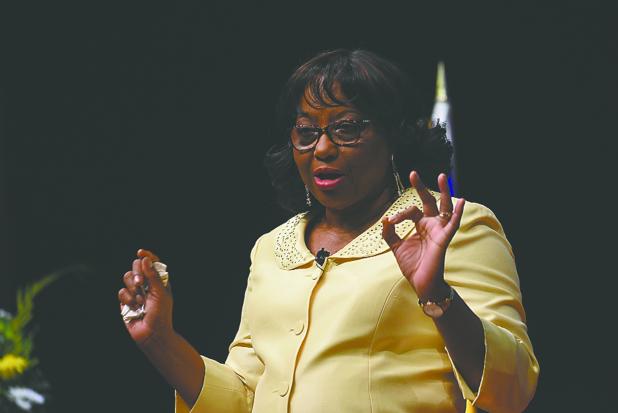
PAHO Director Dr. Carissa Etienne as she delivered the 43rd Sir Winston Schott Memorial Lecture in the Frank Collymore Hall on Monday night.
Health care fix
ALL health reform processes need to tackle the human resource gap in health.
This is the view of Director of the Pan-American Health Organisation (PAHO), Dr. Carissa Etienne, who was the featured speaker at the 43rd Winston Scott Memorial Lecture held under the theme: Healthcare Reform and the Role of Technology.
During the wide-ranging lecture, Dr. Etienne, while highlighting the positives and negative considerations associated with technological advancements, also noted other areas that need to be addressed in the health care system, including the human resource element.
According to Dr. Etienne: “The shortage of health workers, the inadequate distribution and the need to ensure consistency between the skills and job requirements in order to enhance efficiency of the sector, require innovative solutions. We are not producing the range of health care and related workers that are required to address the health care problems that can occur.”
It is against this backdrop that she stressed that there is a need to address the migration of health care workers in the Caribbean region and to develop innovative methods of retaining health care workers.
She also made the point that health reforms will not be possible without more and better financing for health. The director explained that investing in health systems that are equitable and efficient, including interventions to reduce segmentation, is important, adding that benchmark for public financing of health has been set at six per cent of GDP, while noting that Barbados’ is currently around four per cent.
“But this money is to be used efficiently, sustainably and in a fiscally responsible way to expand access, to reduce inequities, through increased financial protection. Increased financial protection will reduce inequities through a planned and progressive process with the growing use of pool mechanisms that tap into various sources of funding...”
When asked about the countries that are going facing economic challenges that may say that they don’t have the wherewithal to increase financing, Dr. Etienne said matter-of-factly “It’s called political will.”
“Many countries have faced financial and economic crises and many have made the decision that they will continue to fund. Because when you face an economic crisis, people lose jobs, so they are unable to pay the fee for service, they are unable to keep up with their insurances, and they are more likely to become ill. So this is not the time to reduce the access to health services for your people.”
In fact, she told audience in the packed Frank Collymore Hall that some countries have proven that investing in health can also spark the economy.
The PAHO Director also stated that Government also has to find ways to reduce the inefficiencies in the health care system. “Because 20 to 40 percent in the investments in health are waste. A lot of that occurs within the hospitals. So we need to sensitise health care workers, we need to have mechanism that can determine where the wastage is and to take measures to stop that wastage.”
She noted that some countries have gone the route of introducing “sin taxes”. “You can tax alcohol, tobacco and sugary beverages, but government must make that decision not to put those monies into the Consolidated Fund,” she opined. (JH)
